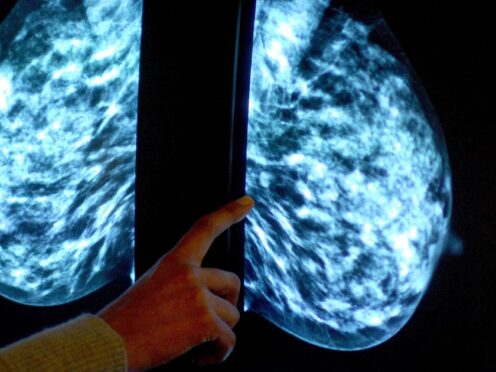
Researchers say they have managed to keep breast cancer tissue viable for at least a week outside of the human body, paving the way for enhanced cancer treatments.
A new study, funded by the Prevent Breast Cancer charity, found breast tissue could be preserved in a special gel solution, enabling scientists to examine it in great detail.
Experts found the preserved breast tissue maintained its structure, cell types and ability to respond to a series of drugs in the same way as normal breast tissue.
The study, published in the Journal of Mammary Gland Biology and Neoplasia, could boost the development of new drugs to treat and prevent breast cancer, without the need for testing on animals.
Lester Barr, consultant breast surgeon and founder of Prevent Breast Cancer, said: “Breast cancer mortality is decreasing in the UK thanks to improved screening and treatment options, but incidences continue to rise and breast cancer is the most commonly diagnosed cancer in the UK.
“It’s therefore really important that we develop new prevention and risk-reduction options for women, especially for those with a high risk due to their family history or genetics.
“This breakthrough means that researchers will be able to test new drugs in the lab with far greater accuracy, which should mean fewer drugs failing at clinical trials and ultimately better results for women affected by this terrible disease.
“It’s a hugely exciting development in animal-free research which puts us in a really strong place to find new drugs to prevent breast cancer.”
Researcher Hannah Harrison, from the University of Manchester, said: “There are various risk-reducing options for women at high risk of developing breast cancer – for example, those with a significant family history or who have mutations in the BRCA genes.
“However, not all drugs work for all women. This new approach means that we can start to determine which drugs will work for which women by measuring their impact on living tissue.
“Ultimately, this means that women can take the most effective drug for their particular genetic make up.
“By testing different hydrogel formulas we were able to find a solution that preserves human breast tissue for at least a week and often even longer.
“This is a real game-changer for breast cancer research in many ways.
“We can better test drugs for both the prevention and treatment of cancer, and can examine how factors like breast density – which we know is a risk factor for breast cancer – react to particular hormones or chemicals to see if this has an impact on cancer development.”
Scientists used the gel solution VitroGel to preserve the tissue.
In their work, they said the identification of new drugs has been previously “hampered by a lack of good pre-clinical models”.
What has been available until now cannot “fully recapitulate the complexities of the human tissue, lacking human extracellular matrix, stroma, and immune cells, all of which are known to influence therapy response”, they said.
It comes as Prime Minister Rishi Sunak hailed a new artificial intelligence (AI)-powered medical trial which “promises to improve the accuracy and speed” of breast cancer diagnosis.
A partnership between the NHS and South Korean firm Lunit uses the Korean company’s image-reading AI technology to help human radiologists in the process of analysing and assessing mammograms.
Writing for the i alongside South Korean President Yoon Suk Yeol, Mr Sunak said the trial was an example of how AI can be used to “transform the world for the better”.
The leaders said: “We all know how vital early detection is – so just imagine what improvements here could mean for millions of women and
their families.”

Enjoy the convenience of having The Sunday Post delivered as a digital ePaper straight to your smartphone, tablet or computer.
Subscribe for only £5.49 a month and enjoy all the benefits of the printed paper as a digital replica.
Subscribe